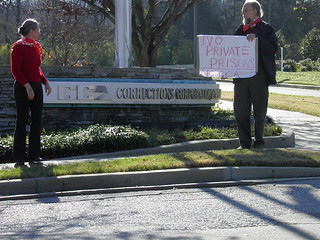The Mexican president who put the Mexican Army onto the streets
to stop the drug war, resulting in 40,000+ deaths, many
collateral damage like
the son of writer Carlos Fuentes,
the Mexican president who
a year ago started hinting that that didn’t work and something else should be done,
is already following the path of his predecessors
Ernesto Zedillo and
Vicente Fox, in calling for the U.S.
to end the war on drugs.
Georgia can’t afford to continue spending a billion dollars a year to lock people up, especially while cutting education.
If we listen to the Mexican presidents, we can save much of that billion and spend much of the savings on education.
T.W. wrote for the Economist 23 November 2012,
“Impossible” to end drug trade, says Calderón,
In an interview recorded last month for this week’s special report
 on Mexico, Mr Calderón said: “Are there still drugs in Juárez [a
violent northern border city]? Well of course, but it has never been
the objective…of the public-security strategy to end something
that it is impossible to end, namely the consumption of drugs or
their trafficking…
on Mexico, Mr Calderón said: “Are there still drugs in Juárez [a
violent northern border city]? Well of course, but it has never been
the objective…of the public-security strategy to end something
that it is impossible to end, namely the consumption of drugs or
their trafficking…
“[E]ither the United States and its society, its government and its
congress decide to drastically reduce their consumption of drugs, or
if they are not going to reduce it they at least have the moral
responsibility to reduce the flow of money towards Mexico, which
goes into the hands of criminals. They have to explore even market
mechanisms to see if that can allow the flow of money to reduce.
“If they want to take all the drugs they want, as far as I’m
concerned let them take them. I don’t agree with it but it’s their
decision, as consumers and as a society. What I do not accept is
that they continue passing their money to the hands of killers.”
The Economist article spelled out what Calderón still doesn’t quite say:
Continue reading →
 something about one of the main tools of racist oppression in the
U.S.? Legalize drugs, thus stopping paying for 75% of the U.S.
prison population, which is far more black than white, and is often
rented out for literally pennies.
Remember, slavery is not illegal
in the U.S., as long as it is punishment for some crime. Second clause, 13th Amendment:
something about one of the main tools of racist oppression in the
U.S.? Legalize drugs, thus stopping paying for 75% of the U.S.
prison population, which is far more black than white, and is often
rented out for literally pennies.
Remember, slavery is not illegal
in the U.S., as long as it is punishment for some crime. Second clause, 13th Amendment:











